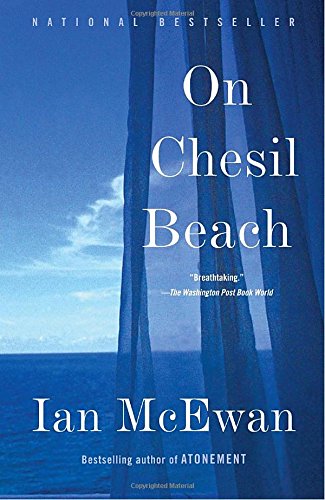Books |
Ian McEwan: On Chesil Beach
By
Published: Jun 05, 2018
Category:
Fiction
For all the praise that follows, I was irritated with “On Chesil Beach” when I read it a decade ago. It seemed too cleverly plotted, too neatly resolved — I thought McEwan was showing off. So I wasn’t eager to see the movie. But an accomplished director wanted to see it for the second time, and she wanted me to see it with her. And it stars Saoirse Ronan, who’s such an emotionally aware actress that she makes intelligence look beautiful. And, with the summer movies upon us, there was simply nothing else to see. Despite the several tacked-on endings — is there a rule that serious movies can’t just end once? — the movie packed a punch the book didn’t: It made overt the proposition that there are moments when you do or don’t make decisions that change and define your life. We’ve all looked back at those moments and asked ourselves: What if? If you’re like me, those moments will surface for you as you watch this movie, or as you talk about it after. That’s an excellent reason to see it. Here’s another…
Now to the book. Ian McEwan made his reputation with ten shortish books, then zoomed to the zenith of English novelists with the 368-page Atonement. The plot had a 12-cylinder engine — a misidentification that wrecked a relationship and dramatically changed lives — and fantastic, you-are-there set pieces. It was the book of the year in 2002; if there’s one McEwan novel to read, "Atonement" is the one.
McEwan followed that triumph with another relatively thick novel, Saturday. The writing was terrific — McEwan is incapable of a dead sentence — but the last third of the book read like a bad movie-of-the-week: London surgeon turns into Bruce Willis. No matter. McEwan was, by then, a critic’s darling who could do no wrong.
“On Chesil Beach” is a short book in every way: less than 40,000 words, lots of white space. When it was shortlisted for the Booker Prize, there were some loud objections.
The story is also small. It’s set in Dorset, England, in July of 1962, after Edward and Florence marry and arrive at a small seaside hotel for their wedding night. They are both virgins. And they are both scared. Well, Edward’s scared — he’s been looking forward to this night for so long he can scarely contain his longing. As for Florence, she’s terrified. No, worse: disgusted. The very thought of sex sickens her — she’s terrified that Edward will thrust his tongue into her mouth and she will throw up into his and that will be the end of their marriage.
There’s an old Hollywood screenwriting instruction: "Cut to the fucking." That is, lose the talk, get to the action. The trick of "On Chesil Beach" is McEwan’s refusal to do that; the book is all frustration and tease. And back story, for what better way to slow the book down than the "how they met" tale? Which, in turn, is compounded by the story of Florence and Edward’s childhoods. [To buy the paperback from Amazon, click here. For the Kindle edition, click here.]
What’s this all about? Showing the difference between appearance and reality. Edward’s a gifted history student; Florence is a more gifted violinist. Though his family is damaged and hers troubled in less clearly-defined ways, it looks as if they should have no trouble negotiating their first full sexual encounter. Indeed, it looks as if — despite the rigid morality that still was operating in 1960 — they might have negotiated it well before they took their vows.
Why didn’t they? Ah, now we’re at the heart of McEwan’s story. They didn’t because they couldn’t talk about sex. Because they carefully tiptoed around the subject. Because, for all their academic smarts, they didn’t understand how avoidance doesn’t prevent confrontation. Because they thought love conquered all.
That last is the deadliest of all — for who has not pushed problems and decisions aside because our hearts were full? And who has not seen those problems surface and bite us, often when we least expect it? For a simply written book with a pretty obvious punchline, it’s deliberarely annoying. And that is the point: McEwan means to make his readers as frustrated as his characters. Short as "On Chesil Beach" is, many times along the way you’ll wish it were shorter.
But then you get to the resolution: what happens in that hotel room and, later, what is said on the beach. And then, still later, how Edward and Florence’s lives play out. It is in these chapters that you may see McEwan for the master jeweler I think he is. Edward and Florence may look to us like minor characters, but to them, their fate is not. I acutely felt the weight of the choices they made — and didn’t.
Many of McEwan’s books are about the moment when character is tested and people make decisions that reverberate all their days. So it is here. A word not spoken, a gesture not made — how little it takes to change the direction of a life. Of two lives. And then of all the lives they touch.
Some will find "On Chesil Beach" a fraud and a cheat, a great writer’s bad book. It may be. I’m a McEwan partisan; I’d rather read his "failure" than the "success" of many other writers. Got a free evening? Feel like reading about sex without the "dirty" parts? Want to remember your own days of waiting and wanting? "On Chesil Beach" will do.


